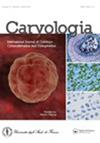加拿大参草乙醇提取物对大蒜分生组织细胞的遗传毒性和细胞毒性
IF 2.1
4区 生物学
Q2 Agricultural and Biological Sciences
引用次数: 2
摘要
加拿大参草在传统医学中主要用于土著社区,作为抗炎、抗病毒药物,治疗咳嗽、发烧和其他疾病,但是,它的使用必须有科学依据。本研究以125,250,500,1000和1500mg /L为浓度,研究了加拿大参草醇提物对大蒜分生组织细胞的遗传毒性和细胞毒作用。每次处理计数2000个细胞;评估有丝分裂指数(MI)和核异常(NA)。资料分析采用方差分析(ANOVA)和卡方分析(X2) (p < 0.05)。根生长受浓度的抑制,差异有统计学意义(p < 0.05)。随着乙醇提取物剂量和暴露时间的增加,心肌梗死呈下降趋势。NA在最高浓度为500、1000和1500 mg/L时升高,与对照组相比差异有统计学意义(p = 0.001)。结果表明,该物种对大蒜细胞周期具有抗增殖作用和遗传毒性活性,并可推广到其他类型的真核细胞。因此,尽管它是一种有益健康的植物,但建议适度使用和低浓度,以避免有害影响。本文章由计算机程序翻译,如有差异,请以英文原文为准。
Genotoxicity and cytotoxicity of Sambucus canadensis ethanol extract in meristem cells of Allium sativum
Sambucus canadensis is used in traditional medicine mainly in indigenous communities as an anti-inflammatory, antiviral, to treat cough, fever and other ailments, however, its use must be validated on scientific bases. The aim of this study was to evaluate the genotoxic and cytotoxic effect of the ethanol extract of Sambucus canadensis in meristem cells of Allium sativum with 5 treatments at concentrations of 125, 250, 500, 1000 and 1500 mg/L. Two thousand cells were counted per treatment; the mitotic index (MI) and nuclear abnormalities (NA) were evaluated. Data were analyzed using variance analysis (ANOVA) and Chi square (X2) (p < 0.05). Root growth was found to be inhibited based on the concentration with statistically significant differences (p < 0.05). As the dose and exposure time of the ethanol extract increased, the MI decreased. The NA increased at the highest concentrations of 500, 1000 and 1500 mg/L and these differences were statistically significant compared to the control (p = 0.001). With the results obtained, it can be shown that the species has antiproliferative effects and genotoxic activity on the Allium sativum cell cycle, which can be extrapolated to other types of eukaryotic cells. Therefore, despite being a plant with health benefits, moderate use and low concentrations are recommended to avoid harmful effects.
求助全文
通过发布文献求助,成功后即可免费获取论文全文。
去求助
来源期刊

Caryologia
生物-遗传学
CiteScore
1.60
自引率
23.80%
发文量
26
审稿时长
12 months
期刊介绍:
Caryologia is devoted to the publication of original papers, and occasionally of reviews, about plant, animal and human karyological, cytological, cytogenetic, embryological and ultrastructural studies. Articles about the structure, the organization and the biological events relating to DNA and chromatin organization in eukaryotic cells are considered. Caryologia has a strong tradition in plant and animal cytosystematics and in cytotoxicology. Bioinformatics articles may be considered, but only if they have an emphasis on the relationship between the nucleus and cytoplasm and/or the structural organization of the eukaryotic cell.
 求助内容:
求助内容: 应助结果提醒方式:
应助结果提醒方式:


